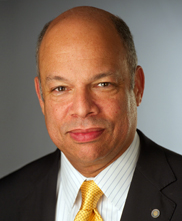5 minutes with... Jeh Johnson
 When did you decide to become a lawyer? Why?
When did you decide to become a lawyer? Why?
Specifically, my first semester of sophomore year at Morehouse College, after I finally realized I was not going to be a professional baseball or football player. I had no more excuses to avoid the books, and lifting my GPA above a dismal 1.8. I needed a goal, and law school and law seemed like good ones. Also, at Morehouse ambition, inspiration and drive are contagious.
More generally, I became aware of the larger world around me a few years before, in 1968. That was an incredible year, packed with the MLK and RFK assassinations, Vietnam, LBJ’s withdrawal, the demonstrations outside the Democratic convention in Chicago, the Nixon/Humphrey/Wallace election, and, finally, Apollo 8. We got a color TV that year and I was captivated by it all, and was oriented then to believe that a citizen should want to be part of national and world events occurring around him.
Starting out, what did you expect from a career in the law?
I expected to serve the public and obtain justice for the underserved. I learned that there are several ways that that can be accomplished. Pro bono activities, for example.
How did you get into the areas of law you are known for today? By design? Chance? Both?
I became a trial lawyer through my experience as an AUSA. In three years I tried 12 jury cases. I tried my cases, your cases, and anybody else’s cases I could get my hands on. If another AUSA had a schedule conflict and couldn’t do a jury selection next Monday, I would take it. I soon discovered that sometimes the reason my colleague was willing to dump the case was because it 'had fleas' – a small evidentiary problem or two they forgot to tell me about.
My foray into national security was a fluke, really. The Clinton White House recruited me to be General Counsel of the Air Force. I had no idea what the job was about, had never been in the military, and had never set foot in the Pentagon. The job made no real sense for me as a career move at the time, but, in retrospect, it was preparation for the much bigger and demanding job president-elect Obama asked me to take on ten years later.
"We must not accept the current conflict, and all that it entails, as the 'new normal'."
What do you consider to have been your big break?
Three-way tie: 1) getting a job offer from Paul, Weiss in 1984; 2) getting a job offer from Rudy Giuliani to be an AUSA in 1988; 3) meeting Barack Obama in 2006.
What differences do you see in today's legal market compared to when you started?
More specialization in private practice, more client demands for specialization. Larger, national firms with dozens of offices. More free-agency, lateral moves. Fortunately, I think Paul, Weiss has stayed true to its culture through all of this. I’ve left the firm three times for public service, but have always remained loyal to it as my private practice home.
What achievement are you most proud of?
There are the things I did in public office that I’m sure will be in my obituary. Less well known: in 1992, I represented a New York city police officer pro bono. He was accused of a homicide, but was exonerated and his career saved. Nine years later, that same cop went on to great acts of heroism at the World Trade Center on 9/11. Also, training and mentoring several generations of younger lawyers.
What do you consider your greatest failure or regret?
Well, let’s just say that in national security, things go wrong on occasion, and the human costs are tragic. It comes with the territory, but if I didn’t regret it I wouldn’t be human.
What law would you change, abolish or create?
Who is your legal hero?
Any lawyer willing to spend long hours and late nights in service to the Nation.
What career would you have in your second life?
NYC subway motorman, preferably the #7 Flushing line.
What slogan would you like to be remembered by?
“‘War’ must be regarded as a finite, extraordinary and unnatural state of affairs. War permits one man – if he is a 'privileged belligerent', consistent with the laws of war – to kill another. War violates the natural order of things, in which children bury their parents; in war parents bury their children. In its 12th year, we must not accept the current conflict, and all that it entails, as the 'new normal'. Peace must be regarded as the norm toward which the human race continually strives.” - Oxford Union, Oxford, England, November 30, 2012
What advice would you give to students trying to enter the legal profession today? And secondly, to those who hope to ultimately get into the areas of law in which you are expert?
You make a living by what you get. You make a life by what you give.